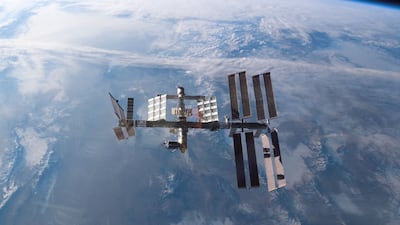The space industry is set to provide big profit and business making opportunities for the private sector globally, the Future Investment Initiative in Riyadh heard on Wednesday.
The industry could be worth more than $1 trillion by 2040 according to Morgan Stanley, while The Space Foundation put its value at $447 billion in 2020.
And the investment is set to come from the private sector as improvements in technology make space more accessible.
"The impact on humanity over the next decade is going to be enormous," said Daniel Goldin, a former Nasa administrator and founder of US-based innovation advisory company Cold Canyon AI.
"The profit making and business making during this transition for those that understand will be wonderful. Within a decade it is going to be all commercial services and the government will be stepping out.
"The technology is maturing to the point that private capital can now take over as the risk of technology development isn’t there."
A public-private partnership model has been undertaken by space agencies worldwide, as more private space companies emerge to offer their services to governments.
Nasa has been leading the way in this through its partnership with Elon Musk's private rocket company SpaceX, which now sends Nasa astronauts to the International Space Station.
Saudi Arabia's Future Investment Initiative 2022 - in pictures
SpaceX has also been providing Starlink — a network of about 3,000 low-orbit satellites designed to deliver high-speed internet services to the world, particularly remote and rural locations.
It has been particularly useful for Ukraine in its conflict with Russia, as a key means of communication used by military forces in areas that don’t otherwise have cellular service.
However, Mr Musk has bemoaned on Twitter that "Starlink is still losing money & other companies are getting billions of taxpayer $".
Anousheh Ansari, chief executive of the XPRIZE Foundation and the first Muslim woman in space, said the industry is changing from the days when it was only governments that had programmes to access space.
"The problem was access was very expensive — people had great ideas on what to do when they get to space but it was expensive to get their payload there," she said.
"Over the past few decades, the cost of access has dropped and it will continue to drop. It’s like the early days of the internet with new browsers coming through and flourishing."
She added that there are lots of opportunities for low-orbit businesses, and highlighted satellite imagery as one which has developed.
Next will be moving industries into orbit, such as manufacturing, harvesting sustainable energy from the sun, and also data centres given the cold temperatures, she said.
"In 14 years we will have privatised space stations and orbiting stations that are doing activities such as research and eventually manufacturing," she said. "We will also have the beginnings of a permanent base on the moon and early stage new businesses looking at how to extract the resources of the moon. Also a base for launching towards Mars."
Governments will be doing the core technology development, while all services will be coming from private capital, according to Mr Goldin.
"Governments will just be doing the research and private capital will create the incredible wealth," he said.
In the UAE, figures from 2019 show the country's investments in space exceeded Dh22bn ($5.99bn), with 57 space-related establishments operating in the country helping create 1,500 jobs.
Since the launch of the UAE’s Mars mission in 2020, more private companies have set up in the Emirates.
The UAE Space Agency has launched a Dh3bn national investment and development fund for the space sector, with private companies to benefit most.
Last month, the agency launched a survey to measure how the space sector has contributed to the national economy.































